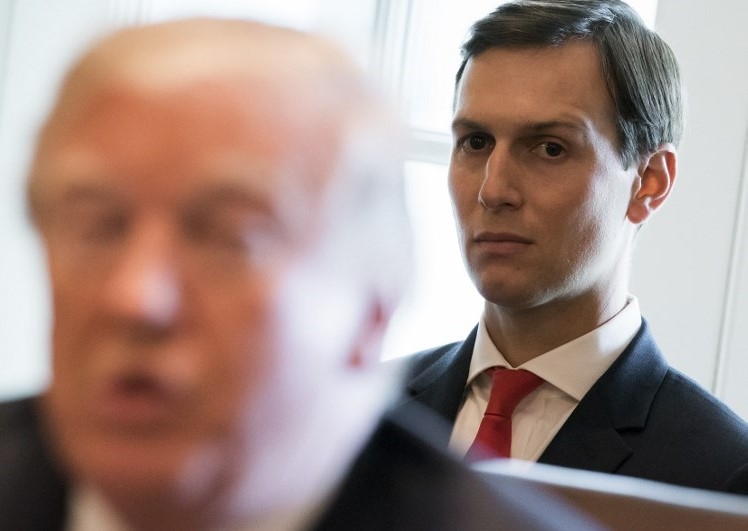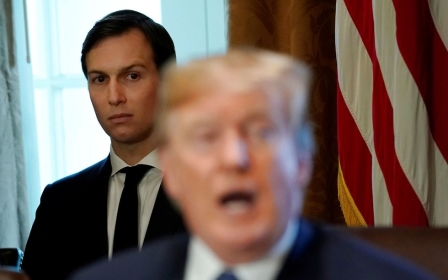Cliches, lies and double standards: Jared Kushner's twisted views on Palestine

On 24 June, Jared Kushner, US President Donald Trump's son in law and his point person on US Middle East relations, gave an interview to the London-based Al Quds Al Arabi website. After reading the interview it is difficult to escape a further sense of hopelessness about the prospect of a fair deal between the Israelis and the Palestinians.
If the intellectual background arising from Kushner's answers is going to be embodied in the "deal of the century" that the Trump administration is expected to announce soon, Palestinians must prepare for another cold shower.
A distorted vision
The interview is so imbued with old cliches, lies, double standards and die-hard distorted visions of the situation that it is almost impossible to dismantle all of them.
Anyway, we will try quoting directly the words issued by the First Son in Law. "The prospects for peace are very much alive," said Kushner. He must possess a unique sense of optimism to claim such a nonsense considering the situation on the ground and the attitude of the current Israeli government.
If the Palestinians were really ready to be bought, peace would have been achieved decades ago.
"The [Arab] leaders we met with all care a lot about the Palestinian people." It would be interesting to know to which Arab leaders Kushner is referring.
Looking at certain statements recently attributed to Saudi Crown Prince Mohammed bin Salman, or the Egyptian government's complicity in the closure of Gaza, it is difficult to find an abundance of care about the Palestinian people, at least among Arab leaders.
"They [Arab leaders] want a deal where the Palestinian people can live in peace and be afforded the same economic opportunities as the citizens of their own countries."
It is time that the US administration finally understands that Palestinians are not only interested in their economic situation but mainly in the fulfilment of their legitimate political rights. Focusing exclusively on the economic situation, although quite important, will continue to fuel the suspicion that the US "mediation" is trying to buy Palestinian's compliance with an unfair deal in exchange for money.
It did not work in the past, it will not work in the future. If the Palestinians were really ready to be bought, peace would have been achieved decades ago. This was Tony Blair's fixation for years as special representative of the Quartet: it produced no results but the painful delay and derailment of the peace process.
Clinton's false narrative
"They [Arab leaders] want to see a deal that respects the dignity of the Palestinians and brings about a realistic solution to the issues that have been debated for decades," said Kushner. Translation: forget East Jerusalem as capital, the right of return and a Palestinian state along the line of 5 June 1967 with minor adjustments (land swaps) agreed by the parties.
This position is attributed to the Arab leaders, another subtle expedient to apply pressure on the Palestinian leadership.
Again, Kushner persists in the wishful thinking of all previous US administrations, according to which Palestinians can be bought to convince them to drop their legitimate political rights.
"However, I do question how much President Abbas has the ability to, or is willing to, lean into finishing a deal." Kushner is not touched by the slightest doubt about Prime Minister Benjamin Netanyahu's ability or will to lean towards finishing a deal.
Resolving the core issues is a prerequisite for creating the conditions for a better life, not the other way around
"I don't think the Palestinian people feel like their lives are getting better and there is only so long you can blame that on everyone other than the Palestinian leadership."
Kushner gives the impression that Israeli actions have been irrelevant in determining the current dire conditions of Palestinian lives. The only responsible party is the Palestinian leadership. Former US president Clinton’s false narrative is still alive and kicking.
The sad daily reality
"The people of Gaza are hostages to bad leadership. Their economy has spiralled downward because of the inability to have connectivity with the world.” Wrong. The people of Gaza have been made hostages in the biggest open-air prison on the planet and they have no connectivity with the world simply because they have been locked up with no possibility to connect with anyone.
"Many countries would be willing to invest in Gaza if there was a true prospect for a different path. It will take some leadership in Gaza though to get on that path." More wishful thinking. No country is interested to invest in Gaza knowing that their eventual investment could be destroyed at any moment by Israeli jets.
"The narrative of victimhood may feel good for the moment and help you grab headlines, but it doesn't do anything to improve lives." It is not a narrative, it is the sad daily reality of Palestinians under Israeli occupation.
"We are committed to finding a package of solutions [for the traditional core issues] that both sides can live with. Simply resolving core issues without creating a pathway to a better life will not lead to a durable solution." It is the politics stupid! Resolving the core issues is a prerequisite for creating the conditions for a better life, not the other way around.
"Don't let your leadership reject a plan they haven't even seen." Why should the Palestinian leadership come and see a plan that the supposed "honest broker" has already agreed beforehand - as on all previous occasions - with the Israeli government?
If the Trump administration really believes it can persuade the Palestinians to sign up to "the deal of the century" with such a clumsy exercise in public diplomacy as Jared Kushner's interview, and such a serially flawed approach, it is definitely far more amateurish than previously imagined.
- Marco Carnelos is a former Italian diplomat. He has been assigned in Somalia, Australia and the United Nations. He has served in the foreign policy staff of three Italian prime ministers between 1995 and 2011. More recently he has been Middle East Peace Process Coordinator Special Envoy for Syria for the Italian government and, until November 2017, ambassador of Italy to Iraq.
The views expressed in this article belong to the author and do not necessarily reflect the editorial policy of Middle East Eye.
Photo: US President Donald Trump speaks alongside his senior White House Adviser Jared Kushner (R) during a Cabinet Meeting in the Cabinet Room of the White House in Washington, DC, on 16 October, 2017 (AFP)
New MEE newsletter: Jerusalem Dispatch
Sign up to get the latest insights and analysis on Israel-Palestine, alongside Turkey Unpacked and other MEE newsletters
Middle East Eye delivers independent and unrivalled coverage and analysis of the Middle East, North Africa and beyond. To learn more about republishing this content and the associated fees, please fill out this form. More about MEE can be found here.






